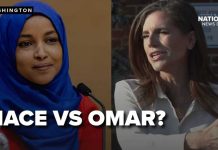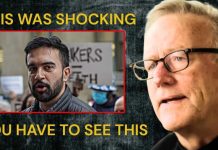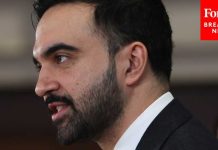
One campaign promise—an Arabic language charter school—has the power to scramble New York’s political tribes, upend the education debate, and ignite alliances that no one saw coming.
Story Snapshot
- Andrew Cuomo pledges New York City’s first Arabic language charter school to win support from Muslim and immigrant communities.
- The proposal draws sharp contrast with Democratic rival Zohran Mamdani, who opposes charter expansion.
- Muslim leaders and mosque networks rally behind Cuomo’s campaign, while teachers’ unions dig in against it.
- The story spotlights the intersection of education equity, identity politics, and coalition-building in 21st-century New York.
Cuomo’s Arabic Charter Gambit: A Calculated Appeal to NYC’s Fastest-Growing Community
Andrew Cuomo, the former governor with a knack for reinvention, has zeroed in on a political prize that could tip the balance in New York’s mayoral race: the city’s sprawling, under-represented Muslim and Arabic-speaking communities. The headline pledge—a city-backed Arabic language charter school—landed in October 2025, not in a press release, but in the echoing halls of Bronx mosques. Cuomo, running as an independent, made the rounds at Ansarudeen Islamic Center and Darou Salam Mosque, promising a school that would “do for Arabic what Hebrew and Greek charters did for their communities.” The pitch, aimed squarely at families frustrated by a public system lacking linguistic and cultural accommodation, is as audacious as it is shrewd.
Cuomo’s team frames the charter push as equity, not religious favoritism. “Arabic instruction is a matter of equity, not religion,” he insists, invoking the success of the Hebrew Language Academy and Hellenic Classical Charter School as precedents. The timing is no accident. As New York’s Muslim population surges—almost 200,000 students now speak Arabic or hail from Muslim homes—the absence of a dedicated school stands out. Sheikh Ibrahim Niass, a leading Bronx imam, called Cuomo’s pledge “welcomed news.” Support from mosque leaders piled up quickly, with Imam Bamba Hedree of Darou Salam stating, “We welcome his vision for the city, including his commitment to support New York City’s first Arabic language charter school.”
Mamdani Pushes Back: The Charter Divide and Union Resistance
Cuomo’s move is more than just a campaign promise—it’s a direct challenge to Zohran Mamdani, the Democratic front-runner and the city’s first Muslim mayoral hopeful. Mamdani, running on a progressive, anti-charter platform, has the endorsement of the United Federation of Teachers (UFT), which sees charters as a threat to public school funding and stability. Mamdani’s camp accuses Cuomo of opportunism and, at times, of stoking Islamophobia to divide voters, a charge mosque leaders reject outright. The friction between the candidates is as much about education policy as it is about whose vision of representation and inclusion will define the city’s future.
This clash of perspectives has injected new urgency into New York’s long-simmering charter school debate. Unions warn of resource diversion and school “fragmentation.” Charter backers argue that language-specific schools empower immigrant families and boost achievement, citing successful models for other communities. For many Muslim and Arabic-speaking families, the choice comes down to practical outcomes: a system that reflects their children’s heritage, or one that leaves them on the margins. The stakes, both political and personal, have rarely been higher.
Religion, Representation, and the Battle for Coalition Politics
The battle lines are not as predictable as they seem. Cuomo’s campaign has drawn endorsements not only from Muslim religious leaders, but also from African immigrant networks and grassroots organizers who see the charter as overdue recognition of New York’s diversity. These alliances hint at a fracturing of old political coalitions, where ethnic and religious identity, rather than party loyalty, may drive turnout in November. Cuomo’s history—support for the Ground Zero mosque, opposition to the Muslim ban—gives his pitch credibility in some quarters, even as Mamdani’s supporters accuse him of political calculation.
Behind the campaign rhetoric lies a deeper question: Who gets to define equity in America’s largest city? Mosque networks mobilize, teachers’ unions rally, and immigrant parents weigh long-term educational outcomes against short-term political promises. The city’s Department of Education and City Council, caught in the crosshairs, will ultimately decide if Cuomo’s pledge becomes policy or campaign footnote. For now, the Arabic charter school proposal is a litmus test for cultural inclusion, coalition-building, and the limits of progressive orthodoxy.
Ripple Effects: New York’s Education Wars Go National
Cuomo’s proposal, though still a campaign pledge, is already shifting the city’s political landscape. If realized, the school could set a precedent for other immigrant communities seeking linguistic and cultural accommodation—and for other cities grappling with similar demographic shifts. Education experts point to successful language-focused charters as evidence that targeted schools can drive academic gains and community integration. Skeptics warn of a slippery slope toward privatization and the erosion of public school resources. The outcome may redefine not only New York’s approach to diversity, but the national conversation about what public education owes to its most vulnerable students.
The next mayor will inherit an education system at a crossroads, torn between the promise of equity and the politics of division. As mosque leaders, union bosses, and immigrant parents all stake their claims, one truth emerges: in New York, the future of public education is written not just in policy, but in the language of the city’s newest voices.
Sources:
Little Africa News – Darou Salam
Andrew Cuomo campaign – Ansarudeen Islamic Center
Little Africa News – Muslim Communities
Andrew Cuomo campaign – Endorsements


















